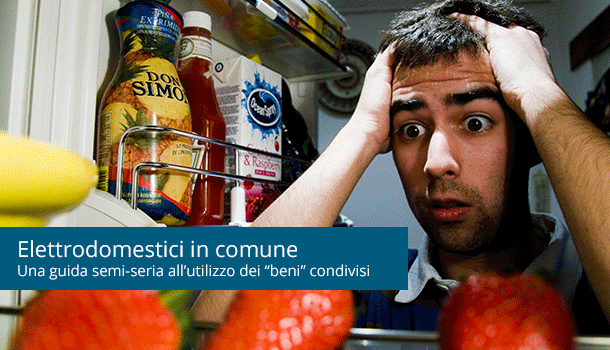Once luxury goods for wealthy families and white-collar workers, today appliances are an established presence in any apartment. Even in the least modernized homes, it is hard not to find at least a refrigerator in the kitchen or a washing machine in the bathroom. Which, in cohabitations, involves sharing not only space, meals and bills, but also the use of appliances and utensils that contribute to the well-being and comfort of daily life. Comfort and convenience that, if not managed properly, can also give rise to a series of bitter internal feuds capable of inexorably upsetting the balance of a home.
Here is a semi-serious guide to stress-free management between tenants of some appliances that it is more typical to find yourself using in common.
Indice contenuto
The refrigerator

Among the appliances that cannot be missed in a home (at least in those with a kitchen) is, of course, the refrigerator. The classic form of refrigerator management in cohabitation is the typical “shelf” form, where each refrigerator shelf bears the name of its owner. This is why the refrigerator of off-campus students looks like a layer cake, in which the each shelf resembles the soul of the person who runs it and can store junk food of all kinds (the eternal adolescent), alternating with only seasonal vegetables (the health nut), convenience foods crammed into every nook and cranny (the lazy person) or even shelves of absolute cosmic emptiness (the tireless worker). For the freezer, however, it works on a first-come, first-served basis, which is why it is very hard to live with roommates who import everything needed for dinners from home until next Christmas. Before letting all this good stuff thaw and spoil (from which, always remember, you also happen to benefit!), try the technique of soy ice cream: before commanded holidays or big exoduses, leave a tub of a flavor of ice cream in the freezer that no one will eat and that will only serve to keep your legitimate space for when you need it.
The washing machine

The other typical appliance from any shared house is the washing machine, which in student housing is almost always old and noisy. Reason why it is important to avoid operating it during the night, so as not to give neighbors additional reasons to complain. The sustainable average for a mixed house is one to two times per week per tenant, although it is easy to run into those who claim to use it almost every day and those for whom it is natural to wash clothes once every two weeks, which can become as many as three if you count the days when damp cloths get stuck in the hamper before being put out to dry. With the first prototype, it is necessary to leverage energy-saving needs that are easily justified on partly economic and partly ecological grounds; with the other, it is never the case to stand in for the zealous parent, at least until the smell of wet dog expands throughout the house. For everyone, it is good to remember that clotheslines are not open space closets and should be cleared out as soon as the clothes are dry.
The vacuum cleaner

Not all student housing has a vacuum cleaner. If you have ended up in one of those where this efficient friend of household cleaning is not lacking (either because it was purchased by a shrewd tenant or by generous landlords), consider yourself lucky: sweeping rooms, bathrooms and hallways with a broom and dustpan is increasingly tedious in the act and inaccurate in the result. The only kind of attention a vacuum cleaner requires concerns the bags for collecting dirt, which, just like those for picking up kitchen waste, tend to reach collapse before they see themselves emptied or changed. On average, a bag lasts about three months, which is why wiser vacuum cleaner owners check it at each seasonal change, also cleaning the internal filter with a sponge and the suction duct with a long wooden stick.
Television

As with the vacuum cleaner, the TV set is also among the ordinary but not ubiquitous household appliances. When he is there, he is usually in the kitchen, accompanying lunches or dinners on evenings when it is raining outside or there is little to do. I potential domestic disputes related to TV all depend on Who holds the remote control: those who can’t stand talk show disputes and those who can’t tolerate sarcastic comments about reality TV; those who are TV series junkies and those who invite at least three or four harassing friends to every sports date. Any democratic principle can really do little in the face of television programming. The only solution is not to be taken by surprise. Anticipate and share their planning and, when there are no workable negotiations, find a exit strategy: games are broadcast even in bars and pubs, TV series are now mainly watched online, and there will always be a friend or friend ready to host you and be infected at least for one evening by reality TV chemistry.
Non-ordinary household appliances
Technology is always on the move, and there is no month in which at least one new invention is not produced ready to improve home life. Shared student housing, due to its “deadline” nature, tends to be more immune to the purchase of the latest technical marvels, but this does not detract from the fact that for various reasons it may house less common appliances than those listed so far. From the microwave oven to the ice cream machine, from the state-of-the-art stereo system to the 3D printer, putting an appliance in common is always a nice gesture and improves the quality of social relationships as well as that of comfort. However, it is important to always remember that even the most ephemeral object is given on loan and, sooner or later, will return to the hands of its rightful owner who, just as legitimately, will want to have it back as close as possible to the condition it was in when he or she shared it. In short, one rule applies to every object: use it as your own, remembering that it is not yours.
Ti potrebbe interessare anche:

Pubblicato il 19-05-2023 11:05:53

Pubblicato il 13-05-2023 15:34:33
Pubblicato il 09-05-2023 14:39:52

Pubblicato il 10-01-2023 15:06:59

Pubblicato il
